
8 Dec 2013 by Tony Dibble-
In A Shepherd Looks at Psalm 23, Phillip Keller draws similarities between a man’s and a sheep’s habits. No other group of livestock requires more delicate handling than sheep. The same could perhaps be said of us. Our instincts and behaviour often correspond to those of sheep. Our crowd-mentality, our stubbornness, foolishness and bad habits appear to reflect the same patterns found in sheep. Hence, sheep are used in GOD’s word to show us our own inadequacies as well as to point to us the way that we ought to relate to GOD.
The life of a sheep depends on the shepherd. The sheep knows that. Sheep are readily accustomed to always being on the move. However, they require the constant attention and direction of a shepherd when doing so.
There is an intimate identity involved between a shepherd and his sheep. A good shepherd cares about his sheep and knows the exact number in his flock. He could call them by name. This is why Jesus spoke of Himself as the Good Shepherd (Jn 10:1-15). Every sheep is valuable and a lost sheep would always be sought after until found (Luke 15:4-6).
Sheep are generally timid. They refuse to lie down unless free from fear. A rabbit hopping from a bush can suddenly scatter a whole flock. The words “fear not” are used some 360 or more times in the Bible. The slightest shift in events or circumstances in our daily lives should not trouble us, for the LORD is control of our own destiny and the events in our lives.
In all animal groups, there is a pattern of dominance. Chickens have a pecking order and cattle, a horning order. With sheep it is a “butting” order, knocking into each other’s horns. Sheep would not lie down unless free from friction with the other members of their flock. This is similar to the competition, comparison and fight for status, and the race for assets by mankind. The Good Shepherd’s presence in our lives would arrest this rivalry from taking over our personalities, as we would have surrendered ourselves to Christ and would walk in the Spirit.
If sheep remain hungry, they would refuse to lie down. Much of the land in the Bible is desert pasture; not the emerald grassland seen in temperate climates. Grass is found, a step at a time. It has been nurtured by the overnight dew and comprises small strands that grow behind and underneath from pebbles. The sheep would move in a fixed direction, eating these, a few strands at a time. This is like the Israelites being led in the desert after leaving Egypt and being fed by the manna of GOD, sufficient for a day at a time. Sheep can go for months on end without water and survive on the dew of the grass each morning and late at night, especially in summer. Christ is our Bread of Life (John 6:48-51) who feeds us each moment of the day through His word.
Sheep may be “cast” down. This occurs when they lie down and their centre of gravity shifts, making them unable to get up. If they are carrying lambs, the situation would be critical. Their legs lie in the air and despite rolling over, they are unable to get up. Gases build up in the sheep’s body and this could cut off blood circulation in a few hours, leading to its death. Too much wool on a sheep would be responsible for its being cast down. The only solution is to shear off the wool. And shearing was not something that a sheep enjoyed. The wool was often long and matted with mud, manure and debris. The cares of our own worldly existence may cause us to be cast down helplessly. If that were to happen, we must then depend on Christ to shear us of our own baggage and to restore us in Him. We should not retain our own self confidence and self indulgence as we can lose ourselves amidst the storms of life. Christ is our strength (2 Cor 12:9).
When sheep are cast down, predators are able to attack them. These are usually buzzards or carnivores such as wild dogs. We must never find ourselves in the position where the enemy could attack us. Christ protects us from the consequences of evil attacks through his Holy Spirit who sanctifies us and provides us assurance.
Sheep have to be kept on the move, though not hurriedly. They should not be placed in panic mode as their response then would be unpredictable. At the same time, sheep have a preference for their own comfort zones and this could turn out to be to their own detriment. They would feed on their favourite grazing ground and even eat the roots of the grass. Such over-feeding on the same ground would be devastating. Soil erosion would then be extensive. Their continued presence in a particular place could breed parasites in the area. We need to grow in Christ and in the power of His Holy Spirit and not remain in the comfort zone of the self which only weakens our life in Christ.
Sudden changes in weather can lead to catastrophes like storms and flash floods, especially in autumn. These can give rise to sicknesses and respiratory complications in sheep. Shepherds know that the valleys are the best feeding grounds. However, they know equally well that these areas are also subjected to flash floods and storms. They constantly keep a lookout for these dangers and lead their flocks away from the valleys and on to higher ground when the need arises. The Lord is our Protector and our Provider, always leading us to higher ground with Him.
The only “equipment” a shepherd carries is a rod and a staff. Moses, a one-time shepherd, used a rod. GOD instructed him to do so, in order to perform miracles. Moses was a forerunner of the Good Shepherd. He led a multitude to salvation out of the hell of Egypt and into the Promised Land. The rod assures the sheep that the shepherd is in authority and is in control. The shepherd disciplines the delinquent sheep that strays from the flock by throwing the rod at him, if need be. This gets the sheep in line. The rod was also used to count the sheep “passing” under the rod (Ezek 20:37).When the sheep passed under the rod, the shepherd would part the wool in order to identify wounds and parasitic insects, and treat them.
The rod was also used to draw sheep away from poisonous plants. It would also serve to protect the sheep from predators such as wild dogs and wolves as this was used on the attackers. The shepherd would also use the rod in the nearby bushes in order to kill, at lightning speed, snakes and other creatures that were hidden there. These could sometimes attack or cause unease amongst the flock. Sheep on the outer margins of the flock were the most likely to be attacked by predators. Hence, the company of close Christians within the centre often has its comforts. Our enemy walks about seeking those that he may attack (1 Pet 5:8).However, all authority is vested in Christ (Matt 28:18) and it is this that ensures our protection.
The staff is used for the shepherd’s support. It is curved at one end. No other job has such an implement. It draws sheep together in a close relationship. Our relationship is with Christ. The staff is also used to unite a newborn lamb with its mother if they are separated. The scent of the shepherd’s hands may be rejected by the mother if found to be on the infant. Another use of the staff is to draw individual sheep for their close inspection if any are observed to be in an unusual state. The staff would also be to guide sheep and this was done by exerting pressure on their sides rather than being beaten with it. Sometimes sheep may be stuck in thorn bushes when they are greedy for the last few stumps of grass under these bushes. The staff would then be used to separate them out. These are indications of how Christ relates to us, protecting and preserving our relationship with Him, monitoring our every move and the threats from our enemies, and ministering to us.
Notably, in summer, parasites would thrive on sheep. The nose fly was the worst of these. Its eggs would enter the head of the sheep. When this happened, the irritations were so intense that sheep would possibly injure themselves in the frenzy in order to be rid of the parasites, knocking themselves against rocks, rushing into thorn bushes or throwing themselves against the ground. Such outbursts would panic the others in the flock, not to mention injuring or maiming the particular sheep.
Sometimes the irritations could be so bad the sheep would run off and their exhaustion would cause them to collapse. At times sheep would refuse to graze in pasture when subjected to such irritations. A loss in weight then arises. Blindness could also set in because of this parasite.
However, once olive oil was applied on the head of a sheep (the equivalent of anointing), there was an immediate change in the animal’s erratic behaviour. This was a process that had to be repeatedly done each time the problem arose. Here we see the oil of the Holy Spirit in our lives, renewing us day by day against the vagaries of the world that we are exposed to. Christ protects us from the consequences of evil attacks and heals our spirits.
Autumn was the start of the mating season. Proud male sheep would engage in combat that could kill, maim or injure each other. To prevent this, shepherds would apply grease on the heads and noses of the males in the flock. This would then make them look silly after crashing battles and therefore avoid further combat. The pride within the male members of the flock needs to be cut down. Pride was the first sin in Eden. And it continues to be the foremost of our sins, and would remain so, until the last judgement.
References for pictures:
http://data3.whicdn.com/images/80006773/original.jpg
http://25.media.tumblr.com/tumblr_mbnb2iJbDw1r9k0q3o1_500.jpg
http://25.media.tumblr.com/tumblr_lmgfizjkLK1qzpyndo1_500.jpg
http://raykliu.files.wordpress.com/2011/11/shepherd-sheep-12.jpg
http://www.christcenteredmall.com/stores/art/hook/zooms/good_shepherd_zoom.jpg

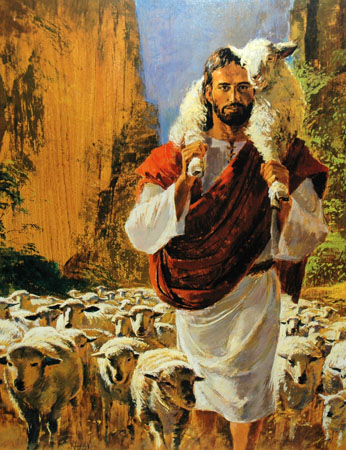

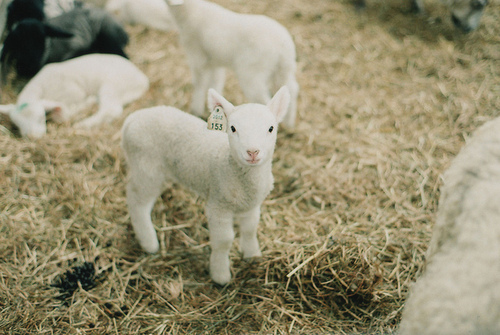
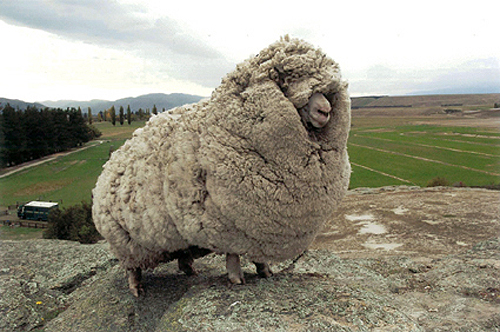
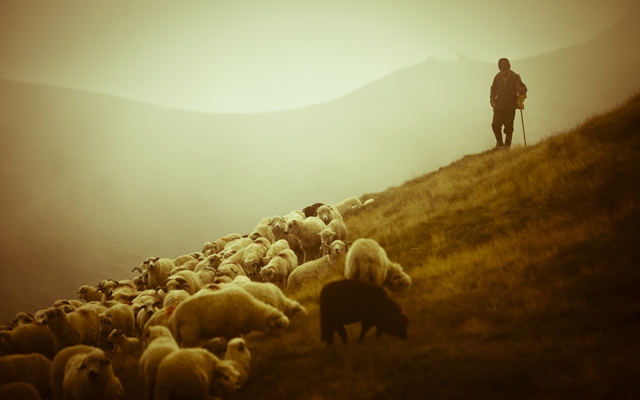



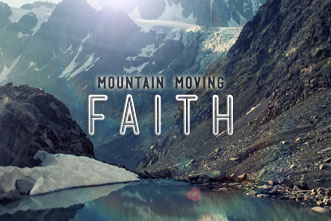


Leave a Reply